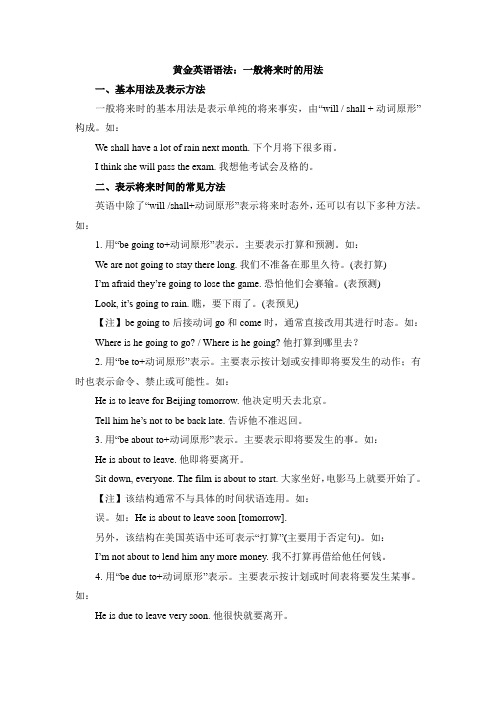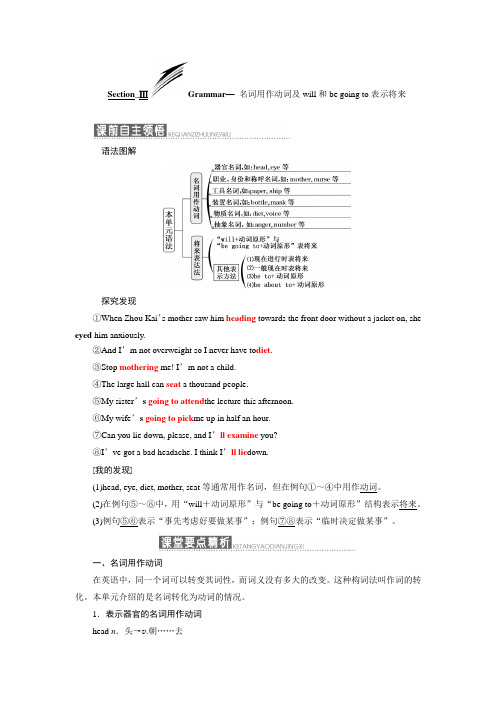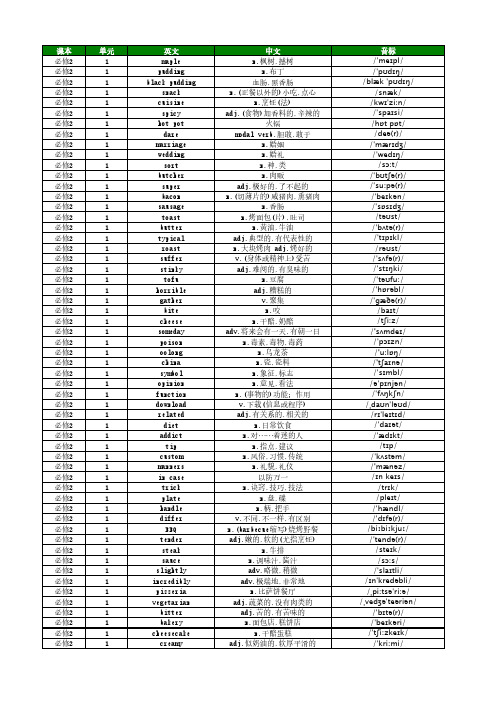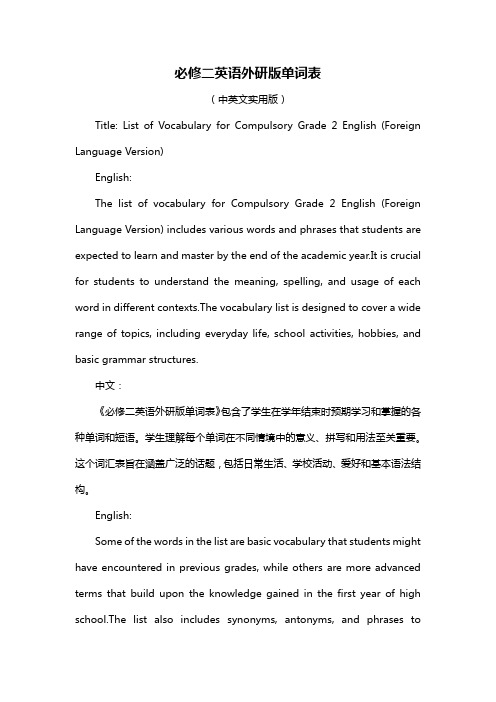外研版高中英语必修二Book2Module1Grammar-将来时间的常见表达方法
外研版高中英语必修2 Module1 黄金英语语法:一般将来时的用法

黄金英语语法:一般将来时的用法一、基本用法及表示方法一般将来时的基本用法是表示单纯的将来事实,由“will / shall + 动词原形”构成。
如:We shall have a lot of rain next month. 下个月将下很多雨。
I think she will pass the exam. 我想他考试会及格的。
二、表示将来时间的常见方法英语中除了“will /shall+动词原形”表示将来时态外,还可以有以下多种方法。
如:1. 用“be going to+动词原形”表示。
主要表示打算和预测。
如:We are not going to stay there long. 我们不准备在那里久待。
(表打算)I’m afraid they’re going to lose the game. 恐怕他们会赛输。
(表预测)Look, it’s going to rain. 瞧,要下雨了。
(表预见)【注】be going to 后接动词go和come时,通常直接改用其进行时态。
如:Where is he going to go? / Where is he going? 他打算到哪里去?2. 用“be to+动词原形”表示。
主要表示按计划或安排即将要发生的动作;有时也表示命令、禁止或可能性。
如:He is to leave for Beijing tomorrow. 他决定明天去北京。
Tell him he’s not to be back late. 告诉他不准迟回。
3. 用“be about to+动词原形”表示。
主要表示即将要发生的事。
如:He is about to leave. 他即将要离开。
Sit down, everyone. The film is about to start. 大家坐好,电影马上就要开始了。
【注】该结构通常不与具体的时间状语连用。
如:误。
如:He is about to leave soon [tomorrow].另外,该结构在美国英语中还可表示“打算”(主要用于否定句)。
外研版高中英语必修二单词表

外研版高中英语必修二单词表1. achieve -实现,达到(目标、愿望等)2. benefit -好处,益处3. citizen -公民,居民4. climate -气候,天气5. culture -文化,文明6. economy -经济,财政7. employer -雇主,老板8. environment -环境,自然界9. fact -事实,真相10. family -家庭,家人11. govern -管理,控制12. history -历史,往事13. income -收入,所得14. issue -问题,议题15. job -工作,职业16. law -法律,法规17. life -生活,生命18. live -生活,居住19. local -当地的,地方的20. matter -问题,事情21. medicine -药物,药品22. modern -现代的,时髦的23. money -钱,货币24. national -国家的,民族的25. news -新闻,消息26. official -官方的,正式的27. opinion -意见,观点28. party -派对,聚会29. peace -和平,安静30. people -人们,人口31. person -人,人员32. political -政治的,政党的33. problem -问题,难题34. public -公众的,大家的35. quality -质量,品质36. reason -原因,理由37. result -结果,后果38. rich -富有的,富足的39. right -权利,权限40. science -科学,学术41. security -安全,保证42. service -服务,业务43. society -社会,社团44. solution -解决方案,解答45. state -状态,状况46. step -步骤,脚步47. story -故事,小说48. study -学习,研究49. technology -技术,工艺50. time -时间,时机51. town -城镇,市镇52. traditional -传统的,惯例的53. travel -旅行,旅游54. unemployment -失业,失业率55. university -大学,母校56. urban -城市的,城镇的57. vary -变化,不同58. view -观点,看法59. wage -工资,报酬60. winner -获胜者,得奖者61. workplace -工作场所,职场62. world -世界,宇宙63. year -年,年度64. young -年轻的,年幼的65. adult -成人,成年人66. age -年龄,年代67. ahead -在前面,预先68. aim -目标,宗旨69. alive -活着的,活泼的70. alone -单独的,孤独的71. answer -回答,答案72. animal -动物,野兽73. another -另一个,再一74. any -任何的,无论哪个75. area -区域,面积76. arm -手臂,武器77. around -围绕,四周78. art -艺术,技艺79. as -作为,当作80. ask -问,请求81. at -在,于82. back -后面,背部83. bad -坏的,不好的84. bag -袋子,背包85. ball -球,球体86. band -乐队,团体87. base -基础,底部88. basic -基本的,基础的89. be -是,存在90. beach -海滩,海滨91. beauty -美,美丽92. because -因为93. become -成为,变为94. bed -床,卧室95. bee -蜜蜂,蜂96. before -在...之前97. begin -开始,着手98. behind -在...后面99. believe -相信,认为。
高中英语外研版必修2Module 1 Section Ⅲ Grammar— 名词用作动词及will和be going to表示将来

Section_ⅢGrammar—名词用作动词及will和be going to表示将来语法图解探究发现①When Zhou Kai’s mother saw him heading towards the front door without a jacket on, she eyed him anxiously.②And I’m not overweight so I never have to diet.③Stop mothering me! I’m not a child.④The large hall can seat a thousand people.⑤My sister’s going to attend the lecture this afternoon.⑥My wife’s going to pick me up in half an hour.⑦Can you lie down, please, and I’ll examine you?⑧I’ve got a bad headache. I think I’ll lie down.[我的发现](1)head, eye, diet, mother, seat等通常用作名词,但在例句①~④中用作动词。
(2)在例句⑤~⑧中,用“will+动词原形”与“be going to+动词原形”结构表示将来。
(3)例句⑤⑥表示“事先考虑好要做某事”;例句⑦⑧表示“临时决定做某事”。
一、名词用作动词在英语中,同一个词可以转变其词性,而词义没有多大的改变。
这种构词法叫作词的转化。
本单元介绍的是名词转化为动词的情况。
1.表示器官的名词用作动词head n.头→v.朝……去hand n.手→v.交出;传递face n.脸→v.面对back n.背→v.倒车;支持shoulder n.肩膀→v.肩负;承担nose n.鼻子→v.闻出;觉察eye n.眼睛→v.注视When the famous star came in, all people eyed her.当那位著名明星进来时,所有的人都注视着她。
高中英语外研版 单词表 必修2

3
plastic
adj.塑料制的
/ˈplæstɪk/
3
/dɪˈzɜ:t/
2
attract
v.吸引,引起……的兴趣
/əˈtrækt/
2
firework
n.烟火,烟花
/ˈfaɪəwɜ:k/
2
decorate
v.装饰,布置,美化
/ˈdekəreɪt/
2
riddle
n.谜,谜语
/ˈrɪdl/
2
competition
n.比赛,竟赛
/ˌkɒmpəˈtɪʃn/
2
formal
必修2
2
envelope
n.信封
必修2
2
pole
n.(行星)地极,(地球)南北极
必修2
2
handwritten
adj.手写的
必修2
2
regular
adj.频繁的,经常的
必修2
2
polar
adj.地极的
必修2
2
roof
n.(建筑物、汽车等)顶,顶部
必修2
2
complain
v.抱怨,不满,发牢骚
必修2
2
adv.不管,不顾
必修2
2
inequality
n.(社会上的)不平等
必修2
2
fantasy
n.幻想,想象
必修2
2
novel
n.(长篇)小说
必修2
2
limitless
adj.无限的
必修2
2
regard
v.认为,看作
必修2
2
regard ... as ...
必修2 M1 Grammar 将来时

用一般现在时表将来
主要用于表示根据日历、时间表,时刻表等 规定预计要发生的动作。常用的有 be,arrive, begin, come, go, leave, return, start, stay等。 eg. School begins on February 5. 学校将于2月5日开学。 eg. The plane takes off at 15: 05. eg. The meeting is at 9:00 tomorrow morning. 会议将在明天九点开始。
GRAMMAR 2 future tense 一般将来时主要有一下几种形式 1. will do 2. be going to do 3. be to do 4. be about to do 5. 用现在进行时表将来 6. 用一般现在时表将来
用will的情况
a. will表示客观上将来势必发生的事情。 eg. It will become warm when spring comes. eg. Tomorrow will be Friday. b. 表示说话人的揣测。 eg. She will be right after taking the medicine. eg. Put on your jacket. You will get a cold. eg. You will be probably feel better in a few days.
Complete the sentences with will or be going to. A You use will when the speaker ___ decides to do something as he speaks. be going to B You use __________ when someone has decides to do something before.
必修二英语外研版单词表

必修二英语外研版单词表(中英文实用版)Title: List of Vocabulary for Compulsory Grade 2 English (Foreign Language Version)English:The list of vocabulary for Compulsory Grade 2 English (Foreign Language Version) includes various words and phrases that students are expected to learn and master by the end of the academic year.It is crucial for students to understand the meaning, spelling, and usage of each word in different contexts.The vocabulary list is designed to cover a wide range of topics, including everyday life, school activities, hobbies, and basic grammar structures.中文:《必修二英语外研版单词表》包含了学生在学年结束时预期学习和掌握的各种单词和短语。
学生理解每个单词在不同情境中的意义、拼写和用法至关重要。
这个词汇表旨在涵盖广泛的话题,包括日常生活、学校活动、爱好和基本语法结构。
English:Some of the words in the list are basic vocabulary that students might have encountered in previous grades, while others are more advanced terms that build upon the knowledge gained in the first year of high school.The list also includes synonyms, antonyms, and phrases toenhance students" understanding and usage of the words.Additionally, students are encouraged to practice writing and speaking the vocabulary words in order to fully grasp their meanings and usage.中文:列表中的一些单词可能是学生在之前年级已经遇到的basic vocabulary,而其他一些则是建立在高中第一年所获得的知识之上的更高级的term。
高中英语必修二知识点外研版

必修二Module 11. see +宾语+ doing (正在做)hear do (全过程)done (被动)2.fit adj: 健康的keep fit合适的be fit for/ to dov: 适合,合身(大小,形状)fit in 相处融洽suit 适合(颜色,款式,时间)⒊as ①当…时候②由于③随着As time goes on,…..④按照do as (you are) told⑤正如As you can see,As we all know,As is known to us,⒋不定式作定语的用法归纳1). 被修饰名词前有序数词、形容词最高级或the only, the last, the very, the next修饰时,常用不定式作后置定语。
被修饰名词和不定式具有逻辑主谓关系。
Eg. John Smith is the only person to know the secret.2).表示抽象概念的名词,后面用动词不定式做定语,用于解释中心词的内容,如ability, way, ambition, anxiety, attempt, campaign, chance, courage, decision, determination等。
3).如不定式动词是不及物动词作定语时,其后须加一个适当的介词。
例如:Have you got a chair to sit on? 你有椅子坐了吗?⒌⑴pay~ 的短语①注意pay attention to②拜访pay a visit to③付清,还清(债务);得到回报pay off⑵ buy sth for some money 用多少钱买某物sb. spend money on sth. / in doing sth. 把钱花在…上sth. cost (sb.) money (某物)花了(某人)多少钱⒍sure1).make sure that do(时态)When you leave the office, make sure that all the lights are turned off.(灯关上了)2).make sure of / about 确保,弄清楚You’d better make sure of the time and place for the meeting .(弄清楚开会得时间和地点) 3) be sure to do肯定会,务必Be sure to come on time.be sure of / about 有把握,肯定He is to succeed/ win. 他肯定会赢。
高中英语必修2第2单元-一grammer般将来时被动语态

使用一般将来时的被动语态需注意的几个问题:
1.在时间状语从句或条件状语从句中,常用一般 现在时的被动语态代替一般将来时的被动语态。 eg. when the dam is completed, the flood in this area will be controlled.
从A、B、C、D四个选项中,选出可以填 入空白处的最佳选项。
1. The young man says that he will leave the company if he _C___ for this.
A.will be punished B. would be punished
C. is punished D. is going to be punished
•答案 A
•④ —Why don't we choose that road to save
time?
•—The bridge to it________.(四川)
•A.has repaired
B.is repaired
•C.is being repaired D.will be repaired
5. The question is going to _b_e_d_i_s_c_u_s_se_d__ (discuss) by us. 6. The little girl is so pretty that she _w_i_ll_b__e_a_d_m__ir_e_d_ (admire) by all the people when she grows up.
tomorrwoiwll.
/
shall
- 1、下载文档前请自行甄别文档内容的完整性,平台不提供额外的编辑、内容补充、找答案等附加服务。
- 2、"仅部分预览"的文档,不可在线预览部分如存在完整性等问题,可反馈申请退款(可完整预览的文档不适用该条件!)。
- 3、如文档侵犯您的权益,请联系客服反馈,我们会尽快为您处理(人工客服工作时间:9:00-18:30)。
GRAMMAR
将来时间的常见表达方法
【归纳】
英语中将来时间的表达法有很多,下面我们归纳几种最常见的。
结构用法例句
一般将来时will +动
词原形
表示将来某个时间要发生的动作或存
在的状态,常与tomorrow, next week,
in five years等时间状语连用。
I will visit my uncle
tomorrow.
表示说话人说话时要做的事。
Please come here and I
will tell you what to do.
用来表示揣测,常译为“大概”。
I think our new teacher
will be here next week.
be going
to +动词
原形
表示说话者已经决定的计划或安排要
做的事。
My hair is dirty. I’m going
to wash it.
表示说话者根据现在的现象或征兆
“预测”不久即将发生的事情。
The weather forecast says
that it’s going to be warm
tomorrow.
现在进行时现在进行时可以表示将来,可用于此用法的动词
有arrive, come, die, go, leave, return, start等。
My older brother is coming
home on Thursday.
一般现在时表示根据规定、日历、时间表预计要发生的事。
What time does the train
leave?
用在时间或条件状语从句中,表示将来。
I’ll call you again when I
arrive at the station.
“be to +动词原形”结构表示将要发生的动作,可表示安排好的事,也可
表示要求做的事。
We are to have a meeting
next week.
You are to deliver these
flowers before 10.
“be about to +动词原形”结构表示马上就要发生的动作,不与表示将来的时间
状语连用。
Look! The match is about
to start.
【即学即练】
I. 用will或be going to完成下面句子。
1. —Did you tell your mother about the result?
—Oh, no, I forgot. I ________ call her now.
2. I ________ be a teacher after I leave school.
3. Open your mouth, please, and I ________ examine you.
4. Hank says he ________ stop smoking.
5. There ________ be a speech contest next Saturday in our school.
6. Spring ________ come again.
II. 根据括号内的提示翻译下面句子。
1. 下个月,埃米将19岁了。
(will) ___________________________________________________________________
2. 你今天晚上打算干什么?(be going to) ___________________________________________________________________
3. 我们将在校门口见面。
(be to)
___________________________________________________________________
4. 这堵墙将被漆成绿色。
(be going to)
___________________________________________________________________
5. 电影即将开始。
(be about to)
___________________________________________________________________
6. 飞机将于2点30分起飞,4点20分抵达上海。
(一般现在时表将来)
___________________________________________________________________
III. 根据括号内的汉语提示补全下面句子。
1. You needn’t come this afternoon. _________________ (明天我去看你吧).
2. The school sports meeting ___________________ (将在下周举行).
3. It’s 6 p.m. now. ____________________ (我觉得他今天下午不会来了).
4. The plane ___________________ (还有三个小时起飞), so we still have time for dinner.
5. ___________________ (我正要出门) when the phone rang.
6. —I thought I asked you to repair the radio.
—Oh. I am sorry. _______________________ (我马上修理它).
7. Remember _______________________ (你必须10点前回来).
8. I don’t know if he will come tomorrow. _______________________ (如果他来了,我会告诉你的).
参考答案
I. 1. will 2. am going to 3. will 4. is going to 5. will / is going to 6. will
II. 1. Next month, Amy will be nineteen.
2. What are you going to do this evening?
3. We are to meet at the school gate.
4. The wall is going to be painted green.
5. The film is about to start.
6. The plane takes off at 2:30 and arrives in Shanghai at 4:20.
III. 1. I’ll visit you tomorrow
2. will / is going to / is to be held next week
3. I think he won’t come this afternoon
4. takes off / will take off in three hours
5. I was about to go out
6. I will repair it right now
7. you are to be back by 10 o’clock
8. If he comes, I will tell you Common Progress Please Criticize。
